
Rivista Italiana delle Sostanze Grasse
metrics 2024
Illuminating the Role of Fats in Industry
Introduction
Rivista Italiana delle Sostanze Grasse is a prominent journal in the field of Organic Chemistry, published by INNOVHUB SSI-AREA SSOG in Italy. With an ISSN of 0035-6808, this journal serves as a crucial platform for disseminating cutting-edge research and innovation related to fatty substances and their applications in various industries. Though its impact factor is yet to be established, it holds a notable position in the 2023 Scopus Rankings, being categorized in the Q4 quartile for Organic Chemistry, ranking #197 out of 211 journals in this field. The journal's converged years span from 2006 to 2024, showcasing a commitment to ongoing scholarly discourse. Researchers, professionals, and students alike value this journal for its rich contributions to understanding the chemistry behind oils and fats, and the latest advancements in substances relevant to food science, pharmaceuticals, and sustainable practices. While the journal is not currently open access, it is a critical resource for those seeking to expand their knowledge on the intricate roles of organic compounds in various applications.
Metrics 2024
 0.16
0.16 0.60
0.60 0.50
0.50 19
19Metrics History
Rank 2024
Scopus
IF (Web Of Science)
JCI (Web Of Science)
Quartile History
Similar Journals
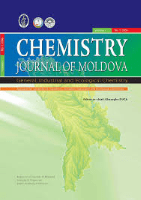
Chemistry Journal of Moldova
Empowering Researchers: Share, Discover, and Innovate in ChemistryChemistry Journal of Moldova is a pioneering open-access journal dedicated to fostering the dissemination of significant research in the diverse fields of chemistry, including Environmental Chemistry, Process Chemistry and Technology, and more. Published by the esteemed Academia Sciences Moldova, Institute of Chemistry, this journal has been at the forefront of scientific inquiry since its establishment in 2006. With an ISSN of 1857-1727 and a digital presence through its E-ISSN of 2345-1688, it provides an accessible platform for researchers, students, and professionals to share and engage with cutting-edge findings. Although currently ranked in the Q4 quartile in several chemistry categories, the journal is committed to improving its impact within the academic community and aims to highlight emerging trends and technologies in the chemistry domain. The journal's office is located at 3 Academiei Str, Chisinau MD-2028, Moldova. As it converges its publication years from 2016 to 2024, the Chemistry Journal of Moldova invites all contributors and readers to explore its rich repository of research that bridges innovative ideas to practical applications.

Journal of Food Measurement and Characterization
Championing Excellence in Food Research and InnovationJournal of Food Measurement and Characterization, published by SPRINGER, is a pivotal resource for researchers and professionals in the fields of Chemical Engineering, Food Science, and Industrial and Manufacturing Engineering. With an ISSN of 2193-4126 and an E-ISSN of 2193-4134, this esteemed journal has carved its niche since its inception in 2012, continuing to contribute valuable insights until 2024. Ranking in the Q2 category across multiple disciplines, including Safety, Risk, Reliability, and Quality, it reflects a strong commitment to advancing knowledge and innovation within these critical areas. Although it operates under a subscription model, the journal provides an array of access options for institutions and researchers keen to explore novel methodologies and analyses in food measurement and characterization. The journal’s rigorous peer-review process ensures the dissemination of high-quality research, making it an essential platform for advancing the science of food and related industries.

Acta Chimica Slovaca
Championing High-Quality Research in the Chemical RealmActa Chimica Slovaca is a prominent peer-reviewed journal dedicated to advancing the field of chemistry, focusing on high-quality research and innovative studies across various chemical disciplines. Published by SCIENDO, this journal aims to provide a platform for researchers, professionals, and students to disseminate their findings, share insights, and foster collaboration in the vibrant scientific community. With an ISSN of 1337-978X and an E-ISSN of 1339-3065, Acta Chimica Slovaca is recognized for its commitment to the integrity and rigor of research publication. Although specific metrics such as H-index and impact factor were not provided, the journal's alignment with international standards and open access principles emphasizes its goal of maximizing the visibility and accessibility of chemical research. Articles published in this journal cover a broad scope, facilitating comprehensive discussions on theoretical, experimental, and applied aspects of chemistry, thus playing a crucial role in the ongoing education and development of the next generation of chemists.
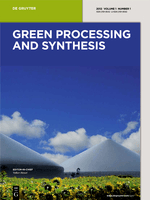
Green Processing and Synthesis
Advancing Environmental Chemistry for TomorrowGreen Processing and Synthesis, published by DE GRUYTER POLAND SP Z O O, stands as a vital open-access journal in the realms of Chemical Engineering, Environmental Chemistry, Fuel Technology, and more since its inception in 2012. With an impressive impact factor and currently ranked in the Q2 category across multiple domains, this journal plays a key role in disseminating cutting-edge research that addresses global sustainability challenges. The journal emphasizes innovative methodologies and sustainable practices that are crucial for advancing green technologies. Researchers, professionals, and students alike are encouraged to explore its extensive archive and contribute to the evolving conversation around environmentally conscious processing and synthesis techniques, all accessible freely since 2019.
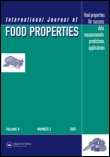
INTERNATIONAL JOURNAL OF FOOD PROPERTIES
Bridging theory and application in food properties.INTERNATIONAL JOURNAL OF FOOD PROPERTIES, published by TAYLOR & FRANCIS INC, is a leading platform for disseminating high-quality research in the field of food science. With an ISSN of 1094-2912 and E-ISSN of 1532-2386, this journal has been committed to open access since 2018, ensuring that groundbreaking studies are readily available to global audiences. The journal has steadily gained recognition for its contribution to the discipline, achieving a Q2 ranking in Food Science and placing in the 68th percentile among its peers according to Scopus metrics. Covering a wide array of topics related to the properties and applications of food, it serves as a valuable resource for researchers, professionals, and students alike. With coverage extending from 1998 to 2024, the journal continually seeks to advance knowledge and foster innovation within the food science community, making it a pivotal publication for anyone serious about this vital field.
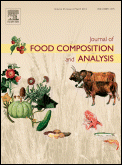
JOURNAL OF FOOD COMPOSITION AND ANALYSIS
Unveiling the Secrets of Nutritional ExcellenceJOURNAL OF FOOD COMPOSITION AND ANALYSIS, published by Academic Press Inc. Elsevier Science, is a leading peer-reviewed journal in the field of Food Science, recognized for its substantial impact on advancing research and knowledge within the discipline. With a commendable Q1 quartile ranking in the 2023 category of Food Science and a Scopus rank of 86/389, this journal holds a prestigious position, emphasizing its significance in crop and food quality research. The journal's scope encompasses a wide range of studies related to food composition, nutrition, and analytical methodologies, aiming to foster innovation and knowledge dissemination in food science. Although it operates under a subscription model, it remains an essential resource for researchers, professionals, and students seeking credible and cutting-edge findings. Established in 1987, the JOURNAL OF FOOD COMPOSITION AND ANALYSIS continues to be at the forefront of food science, contributing to the understanding of food quality and nutrition standards globally.
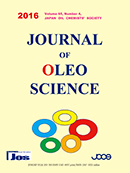
Journal of Oleo Science
Pioneering Knowledge in Chemical Engineering and Medicinal ApplicationsJournal of Oleo Science, published by the Japan Oil Chemists Society, stands as a pivotal resource in the domains of chemical engineering, chemistry, and medicinal applications, with a robust commitment to advancing knowledge in oleochemical research and technology. With an ISSN of 1345-8957 and an E-ISSN of 1347-3352, this open-access journal has been accessible to a global audience since 2021, facilitating the dissemination of high-quality scholarly articles and fostering collaboration among researchers. The journal, which has converged its publication scope from 2001 to 2024, currently holds a respectable Q3 ranking across multiple categories, reflecting its impact in the academic sphere. With Scopus ranks highlighting its position in general chemistry and chemical engineering, the Journal of Oleo Science not only serves as an essential platform for the latest developments in oleo science but also encourages the exploration of innovative approaches to tackling industry challenges. Articles submitted to the journal are subjected to rigorous peer review, ensuring that only the most significant and scholarly work is presented. By championing diverse perspectives and research findings, this journal is an invaluable asset for students, professionals, and academics dedicated to advancing the fields of oleochemistry and beyond.
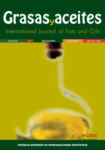
GRASAS Y ACEITES
Fostering collaboration in the study of fats and oils.GRASAS Y ACEITES, published by the Consejo Superior Investigaciones Científicas (CSIC)Food Science and Organic Chemistry since 1991. Based in Madrid, Spain, this journal facilitates the dissemination of innovative research and cutting-edge discoveries pertaining to fats and oils, addressing both their nutritional properties and functional applications. The journal holds a commendable position within the academic community, ranking in the third quartile in both its categories as of 2023, and features a dedicated platform for dialogue among researchers, professionals, and students. By providing unhindered access to its publications, GRASAS Y ACEITES fosters a collaborative environment for advancing knowledge and understanding in its respective fields, making it an essential resource for those invested in food science and organic chemical research.
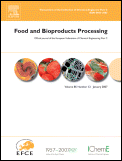
FOOD AND BIOPRODUCTS PROCESSING
Transforming raw materials into culinary excellence.FOOD AND BIOPRODUCTS PROCESSING, published by Elsevier, is a leading journal dedicated to advancing the fields of biochemistry, biotechnology, chemical engineering, and food science. With a strong impact factor and robust rankings—Q2 in Biochemistry and Biotechnology, and Q1 in Food Science—it serves as an essential resource for researchers, industry professionals, and students alike. The journal focuses on innovative research and practical applications in the processing of food and bioproducts, spanning from raw material transformation to product development. By fostering the exchange of knowledge and ideas, FOOD AND BIOPRODUCTS PROCESSING aims to enhance food quality and sustainability while addressing global challenges in food security and environmental impact. With an accessible format and a diverse pool of contributors, this publication stands as a vital platform for groundbreaking studies, making significant contributions to the advancement of technology and practices in food processing and production.
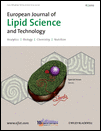
EUROPEAN JOURNAL OF LIPID SCIENCE AND TECHNOLOGY
Connecting researchers to the forefront of lipid knowledge.EUROPEAN JOURNAL OF LIPID SCIENCE AND TECHNOLOGY, published by WILEY, is a reputable academic journal dedicated to advancing the field of lipid science and technology. With an ISSN of 1438-7697 and E-ISSN 1438-9312, this journal serves as a critical resource for researchers, professionals, and students interested in the bioengineering, industrial applications, and nutritional science of lipids. Covering a broad spectrum from biochemistry to food science, it holds distinguished rankings across multiple categories, including Q2 in Chemistry and Food Science, and Q3 in Biotechnology, showcasing its significance in the interdisciplinary study of lipids. The journal welcomes Open Access options, fostering the dissemination of knowledge and innovation in lipid research. With converged years extending from 2000 to 2024, this journal remains at the forefront of lipid-related research, encouraging scholarly contributions that push the boundaries of science and technology.